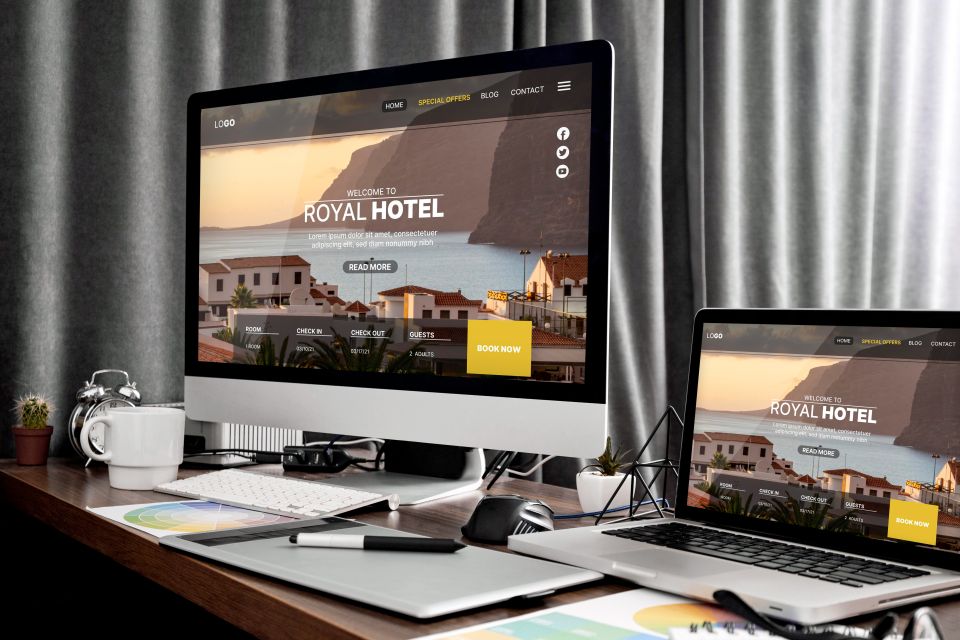
Have you ever come across a website and thought, “I wish I could create something just like this“? Well, now you can! With the art of website cloning, you can create identical online replicas of your favourite sites and make them your own. Whether you want to imitate the design, functionality, or overall user experience, website cloning allows you to achieve just that.
Mastering the art of website cloning may seem like a complex endeavour, but fear not! In this article, we will guide you through the process step by step, helping you create a duplicate website that mirrors your inspiration. From selecting the right tools and software to understanding the legal implications, we have got you covered.
By successfully cloning a website, you can leverage the best features and elements that appealed to you in the first place. Whether you are an aspiring entrepreneur or a web designer looking to expand your skills, learning how to clone websites opens up a world of possibilities. So, get ready to dive into the exciting world of website cloning and create your own online replicas in no time!
Understanding the concept of website cloning
Website cloning refers to the process of creating a duplicate version of an existing website. It involves replicating the design, content, and functionality of the original site to create an identical online replica. The goal is to capture the essence of the website that inspired you and recreate it as closely as possible.
Website cloning can be a powerful tool for individuals and businesses alike. It allows you to tap into the success of existing websites and adapt them to your own needs. Whether you want to create a similar online store, a blog with a similar layout, or a social media platform with similar features, website cloning provides a shortcut to achieving your goals.
However, it is important to note that website cloning should not be confused with plagiarism or copyright infringement. While you are creating a replica of an existing website, it is crucial to respect intellectual property rights and avoid copying content without permission. We will delve into the legal considerations of website cloning in more detail later in this article.
Benefits of website cloning
Website cloning offers a range of benefits for individuals and businesses looking to create their own online presence. Here are some of the key advantages:
1. Time and Cost Efficiency: Cloning a website can save you significant time and resources compared to building a website from scratch. By starting with an existing design and structure, you can focus your efforts on customizing and tailoring the website to your specific needs.
2. Access to Proven Designs: Instead of reinventing the wheel, website cloning allows you to leverage successful designs that have already proven to be effective. By studying and replicating high-performing websites, you increase your chances of success and user satisfaction.
3. Quick Market Entry: If you have a brilliant idea but limited time to develop a website from scratch, website cloning can help you launch your online presence quickly. By cloning a website that aligns with your vision, you can save precious time and start attracting visitors and customers sooner.
4. Learning Opportunity: Website cloning provides an excellent learning opportunity for aspiring web designers and developers. By dissecting existing websites and understanding their structure, you can enhance your skills and gain insights into effective design principles and coding techniques.
Risks and legal considerations of website cloning
While website cloning can be a powerful tool, it is essential to be aware of the risks and legal considerations involved. Here are some key points to keep in mind:
1. Copyright Infringement: Cloning a website without proper authorization can infringe on the copyright of the original site. It is crucial to respect intellectual property rights and obtain permission from the website owner before replicating their design or using their content.
2. Trademark Violation: Cloning a website that incorporates trademarked elements, such as logos or brand names, can lead to legal consequences. Make sure to conduct thorough research to ensure you are not infringing on any trademarks.
3. Data and Privacy Concerns: When cloning a website, it is crucial to handle any user data with care and respect privacy laws. Unauthorized collection or misuse of personal information can result in legal trouble and damage to your reputation.
To mitigate these risks, it is recommended to consult with legal professionals familiar with intellectual property and privacy laws. Obtaining proper permissions and ensuring compliance with relevant regulations will help you avoid legal complications and protect your interests.
Steps to create an identical online replica
Now that we have discussed the concept, benefits, and legal considerations of website cloning, let’s dive into the step-by-step process of creating your own identical online replica. Follow these guidelines to ensure a successful cloning experience:
Step 1: Research and Select the Target Website
Start by identifying the website you want to clone. It could be a competitor’s site, a popular platform, or any website that inspires you. Take note of its design, layout, features, and functionality, as these will be crucial in the cloning process.
Step 2: Choose the Right Website Cloning Software
To clone a website effectively, you need the right tools. Research and select a website cloning software that suits your needs. Look for features such as ease of use, flexibility, and the ability to capture the desired elements of the target website.
Step 3: Begin the Cloning Process
Once you have chosen the software, it’s time to start cloning. Follow the instructions provided by the software to capture the design, content, and functionality of the target website. Pay attention to details such as images, text, links, and interactive elements.
Step 4: Customize Your Cloned Website
After successfully cloning the website, it’s time to make it your own. Customize the design, layout, and content to reflect your brand or personal preferences. Add your own images, text, and branding elements to create a unique online replica.
Step 5: Test and Optimize
Before launching your cloned website, thoroughly test its functionality to ensure everything is working as intended. Check for broken links, responsive design on different devices, and overall user experience. Make improvements and optimizations as necessary.
Step 6: Ensure Security and Privacy
Implement security measures to protect your cloned website and its users. Set up proper SSL certificates, secure login mechanisms, and regular backups to safeguard against potential threats. Respect user privacy by handling data responsibly and complying with relevant privacy laws.
Step 7: Launch and Promote Your Cloned Website
Once you are satisfied with the cloned website’s functionality and design, it’s time to launch it and start promoting it. Utilize digital marketing strategies such as SEO, social media marketing, and content creation to attract visitors and drive engagement.
Choosing the right website cloning software
Selecting the right website cloning software is crucial for a successful cloning experience. Here are some factors to consider when choosing the software:
1. Ease of Use: Opt for a software that offers a user-friendly interface and intuitive controls. This will make the cloning process more efficient and enjoyable.
2. Feature Set: Look for software that provides a comprehensive set of features to capture the desired elements of the target website. Make sure it supports the type of website you want to clone (e.g., e-commerce, blog, social media).
3. Flexibility: Choose a software that allows for customization and flexibility, enabling you to make the cloned website unique and tailored to your needs.
4. Support and Updates: Ensure the software offers reliable customer support and regular updates to address any issues and keep up with technological advancements.
Customizing your cloned website
Once you have successfully cloned the website, it’s time to put your personal touch on it. Here are some customization tips to make your cloned website unique:
1. Branding: Incorporate your own branding elements such as logos, color schemes, and typography to give the cloned website a distinct identity.
2. Content: Replace the cloned website’s content with your own original text, images, and videos. Ensure the content is engaging, relevant, and optimized for search engines.
3. Design Modifications: Customize the layout, font styles, and visual elements to align with your brand and preferences. Consider user experience and ensure the design is visually appealing and user-friendly.
4. Functionality Enhancements: Add or modify features to improve the user experience and meet your specific requirements. This could include integrating third-party tools, optimizing site speed, or adding interactive elements.
Ensuring security and privacy in cloned websites
When cloning a website, it is essential to prioritize security and privacy. Here are some best practices to ensure the safety of your cloned website and its users:
1. SSL Certificates: Install SSL certificates to enable secure communication between the website and its visitors. This ensures that sensitive information, such as login credentials or payment details, is encrypted and protected.
2. Secure Login Mechanism: Implement strong user authentication protocols to prevent unauthorized access to the cloned website’s admin area. This includes using complex passwords, enabling two-factor authentication, and limiting login attempts.
3. Regular Backups: Set up automated backups to ensure you have copies of your cloned website’s files and databases. This ensures you can quickly restore the website in case of any data loss or security breaches.
4. Privacy Compliance: Adhere to relevant privacy laws and regulations when handling user data. Obtain proper consent for data collection, storage, and processing. Clearly communicate your privacy policy to website visitors.
Website cloning best practices
To ensure a successful website cloning experience, follow these best practices:
1. Respect Intellectual Property: Obtain proper permissions and respect copyright and trademark laws. Avoid directly copying content without permission and focus on capturing the essence rather than replicating every detail.
2. Stay Up to Date: Regularly update your cloned website to ensure it remains functional and secure. Keep the software, plugins, and themes up to date to benefit from the latest features and security patches.
3. Monitor Performance: Continuously monitor the performance of your cloned website. Regularly check for broken links, slow loading times, and other issues that may impact user experience.
4. Seek Inspiration, Don’t Copy: While website cloning can provide inspiration, it’s important to add your unique touch and avoid creating an exact replica. Use the cloned website as a starting point and make it your own.
Conclusion
Website cloning is an exciting endeavour that allows you to create identical online replicas of your favourite websites. By mastering the art of website cloning, you can leverage proven designs, save time and resources, and quickly enter the online market. However, it is crucial to respect intellectual property rights, understand the legal implications, and prioritize security and privacy.
With the right tools, software, and best practices, you can create a unique and successful online presence that reflects your vision. So, embrace the world of website cloning, let your creativity flourish, and unlock the potential of creating identical online replicas!
At Emerging Freelancer, we specialize in providing top-notch services for website cloning, offering a seamless solution for clients seeking to replicate the functionality and design of existing websites. Our expertise lies in meticulously recreating websites to capture their essence while ensuring compatibility with the latest technologies and trends. Whether you’re looking to duplicate a competitor’s successful platform or create a staging environment for testing and development, our skilled professionals at Emerging Freelancer are committed to delivering precise and efficient website cloning services. We understand the importance of accuracy and attention to detail in the process of cloning a website, and our dedicated team ensures that every aspect is faithfully replicated, empowering you to achieve your online objectives with confidence. Explore the possibilities of website cloning with Emerging Freelancer, where excellence meets innovation.
